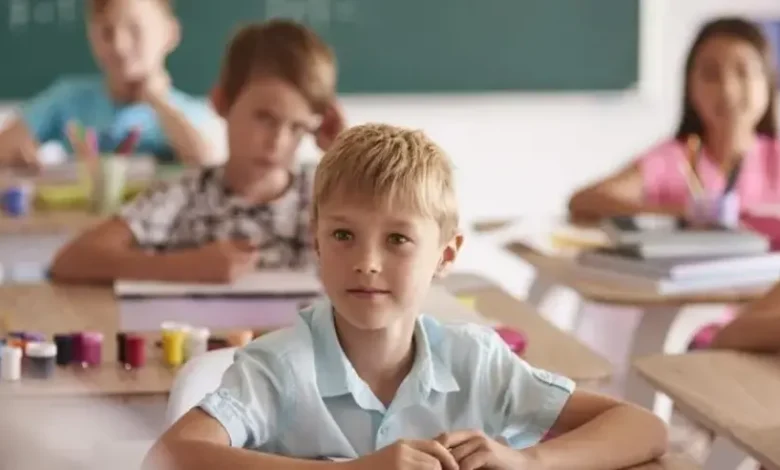The “First Ukrainian School” for refugee children in Poland was recognized as the best in the category “Overcoming difficulties”

After the start of the full-scale invasion, tens of thousands of Ukrainian children found themselves abroad, where new challenges awaited them. Schools in refugee-hosting countries, as well as the education system itself, were not prepared for such a sharp increase in students. Language barriers, lack of places in local schools, bullying and lack of support from educational authorities have become daily difficulties for young Ukrainians. And while some countries, notably Poland, tried to adapt their systems for new learners, the provision of real support remained limited.
In these conditions, Ukrainian educational initiatives abroad have become indispensable. One such example is the “First Ukrainian School” in Poland, which has become a reliable support for Ukrainian children. Created in the sixth week of the war, it immediately opened in three large cities of Poland – Warsaw, Krakow and Wroclaw. The school managed to provide shelter to about four thousand Ukrainian students who fled from war zones or front-line territories and could not immediately adapt to the Polish education system.
Recognition of the “First Ukrainian School” by the World’s Best School Prizes
Recently, the “First Ukrainian School” received recognition at the global level, winning the World’s Best School Prizes 2024 in the “Overcoming Difficulties” category. This prestigious award, founded in 2022 by British entrepreneur Vikas Pota, aims to recognize the best educational practices that demonstrate how schools can support their students and help them in crisis situations. Institutions from 100 countries of the world took part in the competition, which were evaluated in five areas: interaction with the community, environmental initiatives, innovative approach, support of a healthy lifestyle and overcoming difficulties. The experience of the “First Ukrainian School” is recognized as a valuable example of successful adaptation of education for children affected by the war.
Creation of a school without support and on the verge of closure
However, on the way to success, the school repeatedly faced financial difficulties. Despite its importance, the project did not receive systematic support from donors, Ukrainian or Polish authorities, which put it on the verge of closure. Polish authorities have not yet found ways to integrate Ukrainian schools into their legal system, which complicates the activities of such institutions. In conditions where there was no material base, no full-time teachers, no access to educational facilities, the founders managed to find alternative solutions, thanks to which the school began to function.
Adaptation of premises and provision of resources
The “Unbreakable Ukraine” foundation, which became the organizational core of the project, made efforts to equip schools for 500 students each in non-standard locations. For example, in Warsaw, the educational institution was placed in the business wing of a shopping center, and in Wroclaw – in the former office of an IT company. The Krakow school is located in a building designed as an educational institution. All the necessary materials and equipment were obtained with the help of caring entrepreneurs and partially purchased from Ukraine. The financing of the premises, teachers’ salaries and the purchase of textbooks in the first year of the war was provided by donors such as UNICEF and Save the Children: Instead of printed textbooks worth 3.5 million hryvnias, the foundation decided to provide children with tablets with electronic versions of educational materials.
The educational mission of the school: education and emotional support
The mission of the “First Ukrainian School” is not only to provide education for refugee children, but also to create emotional support, preserve national identity and overcome language barriers. Due to the fact that about 1.5 thousand children study at the school, it maintains stability in three cities, satisfying the constant demand for education among Ukrainians. Many children who arrive in Poland after another shelling in Ukraine, or those who had a negative experience in local Polish schools, choose this particular school as a safe alternative, where they can catch up on lost material.
Integration and challenges of the Polish system
The Polish authorities are also taking steps to facilitate the adaptation of Ukrainian schoolchildren by opening special preparatory departments and creating positions of intercultural assistants. However, funding for these programs is still not stable, and many of these initiatives have been delayed until the adoption of the new budget in 2025. Teacher training for teaching Polish as a foreign language is also limited, and the Ukrainian curriculum is not integrated into the Polish system, making it difficult to connect with native education.
Meanwhile, “First Ukrainian School” found its own way to cooperate with the Polish education system. The school has concluded agreements with Polish partner schools, which allows students to study according to the Ukrainian curriculum, while simultaneously attending preparatory classes for learning the Polish language. Next year, it is planned that these students will be able to be enrolled at the same level as their Polish peers, which will allow them to receive grades in the two education systems.
Lack of support from the Ukrainian authorities
In the context of the crisis, the Ukrainian authorities have not yet developed a regulatory framework for supporting their schools abroad. The “First Ukrainian School” is forced to register students for distance learning in Ukraine in order to issue them with educational documents. The school also does not receive financial support from the state for the purchase of textbooks or educational materials.
Thanks to the donor funds of the “Unbreakable Ukraine” foundation, it was possible to start employment programs for Ukrainian teachers in Poland, as well as additional classes for high school students. However, the school’s main project needs systemic funding, and therefore the institution’s work is largely dependent on parents’ contributions.
Thus, the “First Ukrainian School” became an important example of how education can help children overcome the crisis and adapt to a new environment. Despite the difficulties, she demonstrates that Ukrainian children can receive a quality education abroad while maintaining a connection with their own culture and language.





